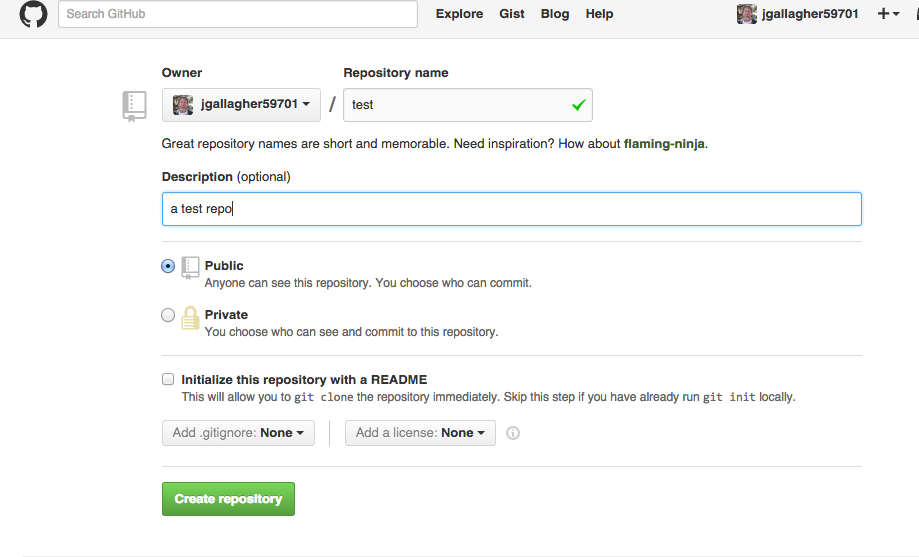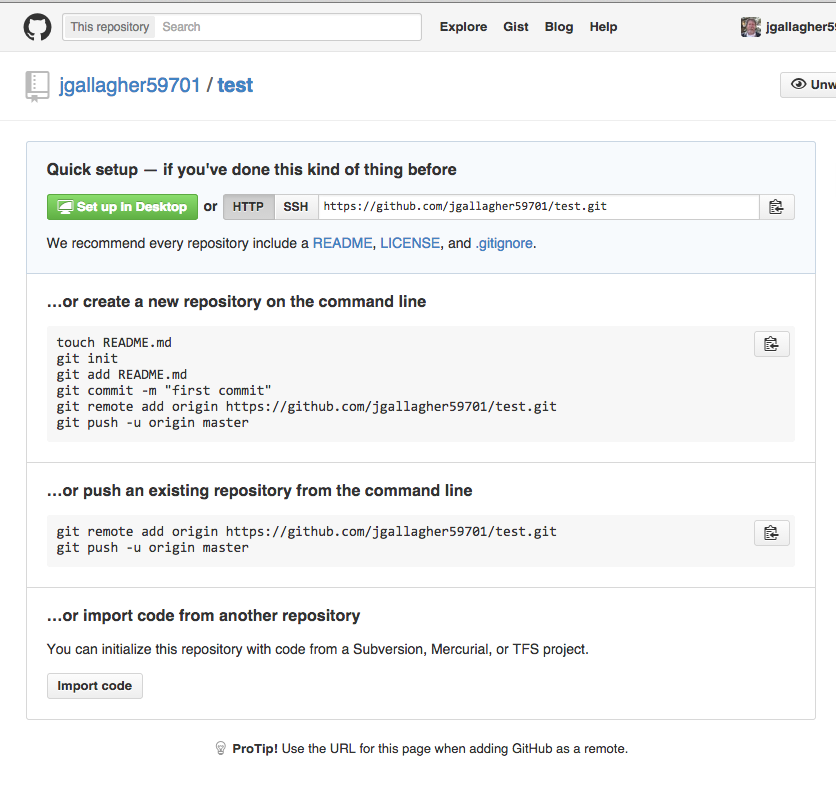Migrating source code from SVN to git
Each project in SVN will become a git repository. Using the technique described below, the complete history and all of the branches and tags will be migrated to the new git repo. Once done, the resulting git repo can then be pushed up to GitHub (or another remote repo server) and used by other people.
Update
Github now has a really complete import tool. As of June 15, 2016, look at Importing from Subversion and paste the URL to the SVN repository in the upper text box and the new (git) repo name in the lower one.
As the import progresses, github will ask about commit authors. Wait until the import is complete and then supply that information. The information in File:Users.txt might be helpful when looking for those email addresses. It contains the user names and email addresses for many of the people recorded in our SVN logs.
Old information
All of the following is moot given the new import features of Github.
Note for OSX: Fix the SVN perl stuff on OSX 10.9
This is a needed fix for the SVN/Perl code on OSX 10.9 (and maybe other versions of OSX). Also, on OSX you may need to remove a copy of svn installing in /usr/local/... or /opt/... This can also cause weird issues with eclipse and checkouts in existing dirs that used svn 1.8 (given that OSX is currently using svn 1.7).
sudo ln -s /Applications/Xcode.app/Contents/Developer/Library/Perl/5.16/darwin-thread-multi-2level/SVN /System/Library/Perl/Extras/5.16/SVN
sudo ln -s /Applications/Xcode.app/Contents/Developer/Library/Perl/5.16/darwin-thread-multi-2level/auto/SVN/ /System/Library/Perl/Extras/5.16/auto/SVN
SVN Users and their Emails
To make the import of a SVN project to git work smoothly, make a file of SVN users and their emails. If there are any SVN users that have committed code and they are not listed here, the whole process fails. There may be a way to accept a default value in lieu of a name and email, but I don't know how.
For the following, also see http://git-scm.com/book/en/Git-and-Other-Systems-Migrating-to-Git where there's more explanation.
First, build a text file that lists all of the users who have made commits in our SVN repo. To do that, run the following over the entire repo
- svn log $svn --xml | grep -e "<author"| sort -u | perl -pe 's/<author>(.*?)<\/author>/$1 = /' > users.txt
- where $svn is the SVN repo URL, e.g., https://scm.opendap.org/svn
The result will be a file listing each username followed by '=' but what git needs is
- username = real name <email>
so edit the users.txt file so it matches the format git expects. For the following commands to work, every name that git comes across when processing code must be defined and that definition must include both a real name and an email. Here's a sample of a file
- benno = Benno Blumenthal <benno@iri.columbia.edu>
- brent = Brent Baker <bsquared@peak.org>
- carlw = Carl Wolfteich <c.wolfteich@gso.uri.edu>
- caron = John Caron <caron@ucar.edu>
- ccancellieri = Carlo Cancellieri <ccancellieri@gmail.com>
- ...
If the users.txt file is missing a name, or has a malformed name, the svn2git command will bail, but that most likely will not happen right away. Instead the failure will happen after much time has passed and the entire operation will be wasted.
Clone the SVN project to a new local git repo
I used two techniques to build (aka clone) the code and load it into a local git repo. The first used git svn clone and the second used svn2git. I think the latter was a bit smoother, and I'll document it here (I'll put using git svn clone in an appendix just in case...). Assuming that users.txt is in the cwd
- mkdir netcdf_handler
- cd netcdf_handler
- svn2git $svn --trunk trunk/netcdf_handler --branch branch/netcdf_handler --tags tags/netcdf_handler --no-minimize-url --authors ../users_sorted.txt | tee svn2git.log
This will leave a new copy of the project (netcdf_handler, e.g.) in the newly made directory. Also in there will be a git repo in the subdirectory .git. Look at the branches and tag using git branch and git tag. The code in the directory corresponds to the master branch. Note that the process is pretty involved and you'll see a fair amount of stuff scroll by in the terminal, including what appear to be checkouts of unrelated code. Have no fear and just let the command run to conclusion.
At OpenDAP, we use a less common subversion repo layout where each 'project' is held in a directory under 'svn/trunk' (e.g., svn/trunk/olfs) and the branches and tags are stored under 'svn/branch/<project>/<branch name>' and 'svn/tags/<project>/<tag name>'. The --trunk, --branch and --tags options to svn2git seem like they work just like the options of the same name to the git svn command.
If this does fail (e.g., a username was not defined in the users.txt file), start over after fixing the users.txt file. To start over, you need to remove the existing (and borked) current directory (e.g., netcdf_handler), make a new one and start over. Alternatively, you can drop using the users.txt file and live with a really ugly commit history/log. Don't do that if at all possible; get the users.txt file right in the first place.
Push the local repo up to a server
At this point the software is stored in a local git repo and we would like it to be on a server. For this, I'm using GitHub. First, go to the server and make an empty repository. For GitHub, this means logging into an account, and choosing the 'Create New' menu item: 
Follow the instructions noting the repo URL. Here's what 'Create New' looks like for a repo named 'test': 
Click the big green 'Create repository' button and you'll see (but read the text and don't just copy GitHub's suggestion for what to do): 
In the directory with the local git repo, run the following commands, which are almost exactly what GitHub suggests, but not quite
- git remote add origin https://github.com/opendap/csv_handler.git
- git push --all --set-upstream origin
Where the git push command is a bit different. First, -u is the same as --set-upstream, but the latter is more verbose, which might come in handy. Second, --all means push up all the branches, something we certainly want, and third, we omit the 'refspecs' master because we used --all.
Done.
Appendix A
Using git svn clone to migrate code. This is based on notes from an earlier attempt
git svn clone $svn --trunk=trunk/svn_git_test --branches=branch/svn_git_test --tags=tags/svn_git_test --authors-file=users.txt --no-metadata svn_git_migrated
(It takes a long time where it's mostly getting various infrastructure things, then the checkouts happen pretty fast, esp. given this project is small)
These commands fix the branches and tags:
git for-each-ref refs/remotes/tags | cut -d / -f 4- | grep -v @ | while read tagname; do git tag "$tagname" "tags/$tagname"; git branch -r -d "tags/$tagname"; done
git for-each-ref refs/remotes | cut -d / -f 3- | grep -v @ | while read branchname; do git branch "$branchname" "refs/remotes/$branchname"; git branch -r -d "$branchname"; done
These set up the GitHub remote repos:
git remote add origin https://github.com/jhrg/svn_git_migration.git git push origin --all git push origin --tags
Appendix B
11/4/14
Here's how to use git svn init and git svn fetch (this will make more sense if you read the Pro git book parts about init and fetch):
git svn init $svn --trunk=trunk/libdap --branches=branch/libdap --tags=tags/libdap --no-minimize-url libdap_git4
Then
cd libdap_git4
git svn fetch
Then here's a screen capture:
[nori:libdap_git4 jimg$] git branch
- master
But it's actually all there...
This line makes the tags fit the git pattern:
git for-each-ref refs/remotes/tags | cut -d / -f 4- | grep -v @ | while read tagname; do git tag "$tagname" "tags/$tagname"; git branch -r -d "tags/$tagname"; done
This line similarly fixes the branches:
git for-each-ref refs/remotes | cut -d / -f 3- | grep -v @ | while read branchname; do git branch "$branchname" "refs/remotes/$branchname"; git branch -r -d "$branchname"; done
It looks bad, but:
[nori:libdap_git4 jimg$] git branch
* master
origin/3.10.0
origin/3.11
origin/3.11.1
origin/3.11.2
origin/3.9.0
origin/dap4
...
origin/trunk
origin/ugrid
origin/width_change
although I did not test to see if the tags were there...